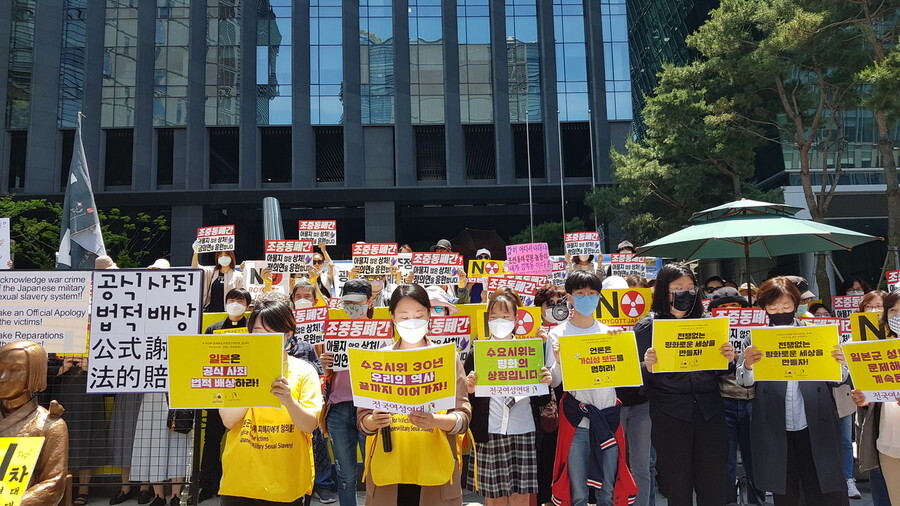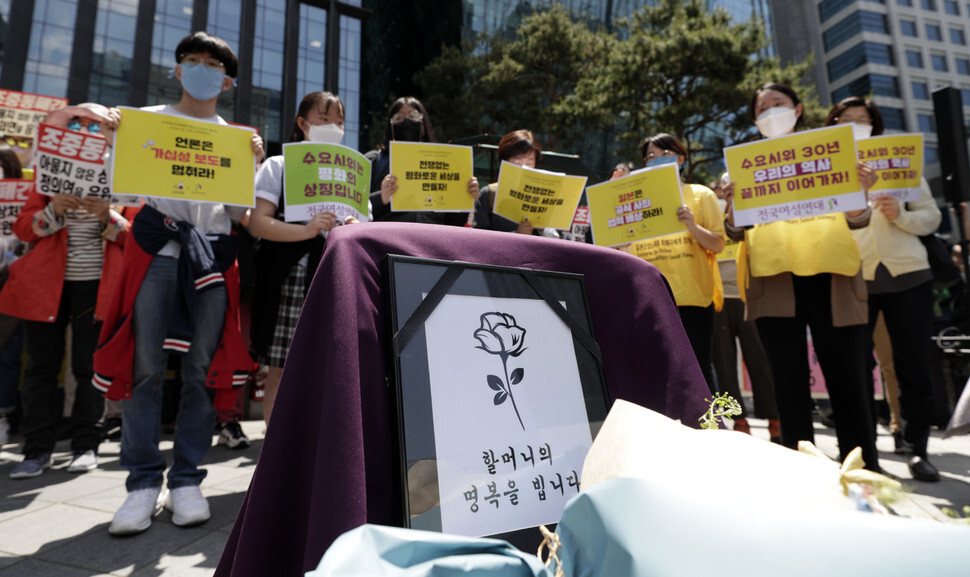hankyoreh
Links to other country sites 다른 나라 사이트 링크
[Reportage] People urge for the continuation of the Wednesday demonstrations

“Stay firm like a rock with the 30-year tradition of Wednesday demonstrations.”
The voices rang out from people gathered at noon on May 27 near the peace statue in front of the former Japanese Embassy in Seoul’s Jongno District. The 1,441st Regular Wednesday Demonstration to Resolve the Japanese Military Sexual Slavery System Issue went ahead unchanged that day even after a press conference two days earlier on May 25 in which 92-year-old Lee Yong-su -- a comfort woman survivor and leader in the human rights movement -- heaped criticism on the Korean Council for the Women Drafted for Military Sexual Slavery by Japan (Korean Council) and its former chair, recently elected Together Citizens’ Party lawmaker Yoon Mee-hyang, while prosecutors conducted two search-and-seizure operations on the group. The roughly 100 people gathered there showed their support for the Korean Council with signs bearing messages such as “See the 30-year history of Wednesday demonstrations through” and “The Wednesday demonstrations are a symbol of peace.”
Speaking at the event, Korean Council President Lee Na-young stated her position on Lee Yong-su’s press conference.
“It pains me deeply, and I am truly sorry [to Lee],” she said.
“I will take it as a message that we should carry on the achievements of the last 30 years of fighting, while also reflecting on and reexamining the fundamental reasons why the victims’ suffering remains unresolved and a solution the problem has been delayed,” she added.

“The Korean Council has appeared at today’s Wednesday demonstration with the mindset of starting over from where this movement began.”
While calling on people to “stop making premature judgments about the Korean Council,” Lee also urged people to stop attacking Lee.
“Please stop with the denunciations and attacks toward the human rights activist Lee Yong-su,” she pleaded. “That truly does do fundamental damage to the meaning and value of the movement.” Her comments distanced the Korean Council from the ad hominem attacks and fake news regarding Lee that have been spread by some of the group’s supporters. She closed her remarks by saying, “I once again apologize deeply to those who have been hurt by this unfortunate business, and I wish to sincerely thank all of you who have stayed with us through these desperate times for giving me this opportunity.”
During the demonstration that day, members of civic groups in South Korea and overseas shared messages of solidarity with the Korean Council. Overseas activists in countries such as Indonesia, Ireland, and Germany sent the council photographs showing them with signs bearing messages including “Japan must officially apologize and provide legal compensation” and “Be like a rock, Wednesday demonstrations.” Yang Jing-ja, who is campaigning for the comfort women survivors in Japan as representative of the group National Movement for Resolving the Issue of the Japanese Military Comfort Women, sent a video message in which she stressed that the Korean Council “has done an excellent job of informing young students in Japan about the comfort women issue” and said it was “very unfortunate that this situation is also being reported on in Japan.”
Sister Salus, a nun with the Association of Major Superiors of Women Religious in Korea, said she had “been allied with the Wednesday demonstrations for 25 years.”
“I earnestly hope that the current situation is resolved according to official procedures and the Wednesday demonstrations emerge from this as a human rights and peace movement for the entire world,” she said.
A counter-demonstration was also held near the Wednesday demonstration site that day by the Army of Mothers and other conservative groups, who denounced the Korean Council with signs bearing messages such as “dismantle public interest groups with unclear accounting practices” and “take down the comfort women statue.”
By Kang Jae-gu, staff reporter
Please direct comments or questions to [english@hani.co.kr]

Editorial・opinion
![[Column] Season 2 of special prosecutor probe may be coming to Korea soon [Column] Season 2 of special prosecutor probe may be coming to Korea soon](https://flexible.img.hani.co.kr/flexible/normal/500/300/imgdb/original/2024/0426/3317141030699447.jpg) [Column] Season 2 of special prosecutor probe may be coming to Korea soon
[Column] Season 2 of special prosecutor probe may be coming to Korea soon![[Column] Park Geun-hye déjà vu in Yoon Suk-yeol [Column] Park Geun-hye déjà vu in Yoon Suk-yeol](https://flexible.img.hani.co.kr/flexible/normal/500/300/imgdb/original/2024/0424/651713945113788.jpg) [Column] Park Geun-hye déjà vu in Yoon Suk-yeol
[Column] Park Geun-hye déjà vu in Yoon Suk-yeol- [Editorial] New weight of N. Korea’s nuclear threats makes dialogue all the more urgent
- [Guest essay] The real reason Korea’s new right wants to dub Rhee a founding father
- [Column] ‘Choson’: Is it time we start referring to N. Korea in its own terms?
- [Editorial] Japan’s rewriting of history with Korea has gone too far
- [Column] The president’s questionable capacity for dialogue
- [Column] Are chaebol firms just pizza pies for families to divvy up as they please?
- [Column] Has Korea, too, crossed the Rubicon on China?
- [Correspondent’s column] In Japan’s alliance with US, echoes of its past alliances with UK
Most viewed articles
- 1[Column] Season 2 of special prosecutor probe may be coming to Korea soon
- 2‘We must say no’: Seoul defense chief on Korean, USFK involvement in hypothetical Taiwan crisis
- 3No good, very bad game for Korea puts it out of Olympics for first time since 1988
- 4Division commander ordered troops to enter raging flood waters before Marine died, survivor says
- 5Is Japan about to snatch control of Line messenger from Korea’s Naver?
- 6Korea’s 1.3% growth in Q1 signals ‘textbook’ return to growth, says government
- 7Is N. Korea threatening to test nukes in response to possible new US-led sanctions body?
- 8[Editorial] Korea’s surprise Q1 growth requires objective assessment, not blind fanfare
- 9[Editorial] New weight of N. Korea’s nuclear threats makes dialogue all the more urgent
- 10‘Weddingflation’ breaks the bank for Korean couples-to-be